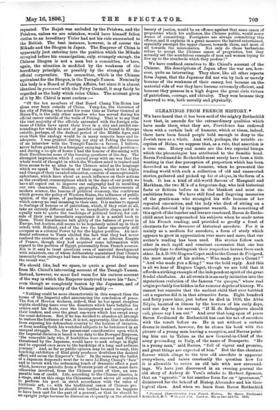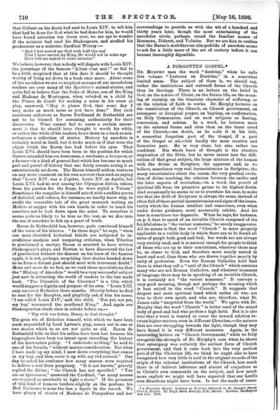GLEANINGS FROM FRENCH HISTORY.• WE have heard that it has
been said of the mighty Rothschild. race that, in amends for the extraordinary qualities which have made them what they are, Providence has endowed them with a certain lack of humour, which at times, indeed, there have been found people bold enough to deny to the Jewish race as a whole. And with, perhaps, the notable ex- ception of Heine, we suppose that, as a rule, that assertion is a true one. Money and music are the two especial bumps which the phrenologist has attributed to the Semitic head.. Baron Ferdinand de Rothschild must surely have been a little wanting in that due perception of proportion which has been, described as the sense of humour, when he presented the reading world with such a collection of old and unassorted stories, gathered and picked up hie et ubique, in the form of a book. It has a kind of old-world flavour of Mangnall and Markham, the two M.'s of a forgotten day, who laid historical facts or fictions before us in the blankest and most un- ambitious form. We have still fond and lingering memories of the gentleman who strangled his wife because of her repeated enormities, and the lady who died of sitting on a sun-dial, deceived by its apparent warmth. In something of this spirit of the teacher and learner combined, Baron de Roths- child must have approached his subjects when be made notes of his French reading, and provided so goodly a feast of chestnuts for the devourer of historical anecdote. For it is mainly as a medium for anecdote, a form of study which appears to grow in appreciation ever more and more, that our author's reading has been used. His stories follow each other in such rapid and constant succession that one has scarcely time to distinguish their respective heroes from each other. InA.D. 996 Hugues Capet said to the Count de Perigord, the most manly of his nobles, " Who made you a Count ? " " And who made you a King ? " was the bold reply. And this is all we hear of Hugues Capet, though we are told that it affords a striking example of the independent spirit of the great feudal chieftains. At all events it is an early initiation into the mysterious evolution of the famous " to quoque," whose real origin probably lies hidden in far remoter depths of history. We cannot but conceive that the earliest child that ever babbled out a repartee did it in that attractive form. Eight hundred and forty years later, just before he died in 1836, the Abbe Sieyes, haunted in illness by the horrors of his early days, said one day to his servant, " If M. de Robespierre should call, please say I am oat." And over that lung span of years Baron Ferdinand de Rothschild has cast his net of anecdote with the result before us. He is not without a certain dramatic instinct, however, for he closes his book with the picture of a young man leaving a reception, and Barras point- ing him out to Telma as the new General-in-Chief of the army proceeding to Italy, of the name of Bonaparte. "He is a young man," said Barras, "full of vigour and promise, and great things are expected of him." But the fine chestnut flavour which clings to the true old anecdote is apparent everywhere, and raises constantly the question how far it is allowable to revive an old tale with new surround- ings. We have jest discovered in an evening journal the old story of Aubrey de Vere's rebuke to Herbert Spencer, that an " agnostic " is but another form for an " ignoramus," disinterred for the behoof of Bishop Alexander and hie theo- logical class. And when we learn from Baron Rothschild • Personal Charnct.risties from French History. By Baron Ferdiumut Rothithi,d, td.?. W th p,t t: a ts. Load's: Maim Han and Co. 1836.
that Colbert on his death-bed sent to Louis XIV. to tell him that had he done for God what he had done for him, he would have found salvation ten times over, we are apt to wonder if the minister had read his Shakespeare, and studied his predecessor as a minister, Cardinal Wolsey:—
" Had I but served my God with half the zeal That I have served my King, He would not in mine age Have left me naked to mine enemies."
We believe, however, that nobody will dispute with Louis XIV. the parentage of the famous " L'etat c'est moi !" or fail to be a little surprised that at this date it should be thought worthy of being set down in a book once more. About some of the anecdotes we are as sceptical as some of our incredulous readers are over many of the Spectator's animal-stories, and quite fail to believe that the Duke of Maine, son of the King and Madame de Montespan, when rebuked as a child by the Prince de Conde for making a noise in his room at play, answered, " May it please God, that some day I may make as much noise as you have done." But such assiduous collectors as Baron Ferdinand de Rothschild are not to be blamed for assuming authenticity for their discoveries. What cannot fail to cause a certain amuse- ment is that he should have thought it worth his while, or rather the while of his readers, to set down in a book so mis- cellaneous a collection of stories. History by anecdote is certainly novel in itself, but it looks much as if that were the object which the Baron has had before his eyes. That Louis XVI. should have been born to the position for which Nature intended him—a huntsman, a mechanic, a bourgeois, or a farmer—is a kind of general fact which has become so much part and parcel of history that one fairly resents seeing it so ostentatiously set down. The Baron himself seldom ventures on any more comment on his own account than such as saying that "Louis XIV. was a Jupiter, Louis XV. an Apollo, but Louis XVI. had no seat among the Olympian deities, unless, from his passion for the forge, he were styled a Vulcan." Sometimes the compiler is himself seized with a sudden access of disbelief, and refuses, for instance, we hardly know why, to credit the venerable tale of the great monarch waiting on Moliere at supper with his own hands, in order to teach his courtiers not to look down upon the actor. To ourselves it seems quite as likely to be true as the rest, as we dive into the sea of anecdote to fish up a pearl of truth.
Baron de Rothschild has, however, quite convinced himself of the value of his labours. " In these days," he says, " when our most cherished historical beliefs are subjected to in- credulous analysis and unsparing criticism, when Tiberius is proclaimed a martyr, Bacon is asserted to have written Shakespeare's plays, and Newton to have discovered the law of gravitation without the descent on his brow of the famous apple, it is not, perhaps, surprising that stories handed down to us from a distant past should meet with irreverent doubt." More and more do we feel, as we read these speculations, that the "History of Anecdote " would be a very successful subject just now in attracting the world of readers to the last made book. "The Chronicle of the Chestnut" is a title which would suggest a dignity and purpose of its own. " Louis XIII. only survived Richelieu three months. Shortly before he died he sent for the Dauphin, and playfully asked him his name.
am called Louis XIV.,' said the child. Not yet, not yet, my boy,' murmured the moribund King." And again our Shakespearian shade rises in rebuke before us,-
" Thy wish was father, Henry, to that thought."
The grim wit of Richelieu himself, with which we have been made acquainted by Lord Lytton's play, comes out in one or two stories which to us are not quite so old. Baron de Rothschild tells us that his sallies have been lost because his biographers have been too intent upon recording the history of his destructive policy. "I undertake nothing," he said to one of his friends, " without mature consideration. But when I have made up my mind, I mow down everything that comes in my way, and then cover it up with my red cassock." One day he asked his confessor bow many masses were required to deliver a soul from purgatory. "It is not known," gravely replied the divine ; " the Church has not specified." " You are an ignoramus," answered the Cardinal, "as many masses are required as snowballs to light a stove." If the grimness of this kind of humour borders slightly on the profane, his Red Eminence is none the less a figure in the record. We have plenty of stories of Madame de Pompadour and her surroundings to provide us with the wit of a hundred and thirty years later, though the most entertaining of the anecdotes circle, perhaps, round the familiar names of Rousseau, Diderot, and Voltaire. But we are fain to confess that the Baron's multifarious olla-podrida of anecdote seems to ask for a little more of the art of cookery before it can become thoroughly digestible.







































 Previous page
Previous page